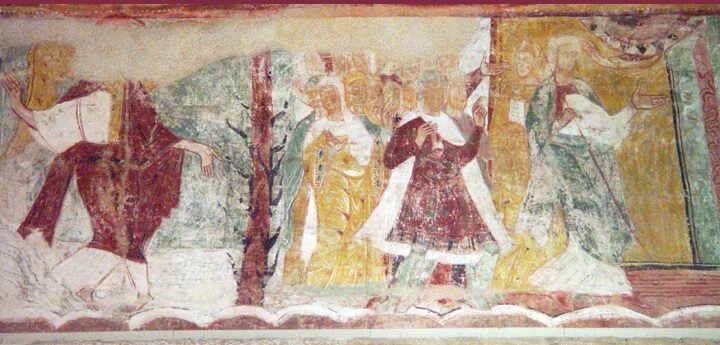Commentary on Isaiah 55:1-11
Isaiah 55:1–11 highlights the power of God’s word to accomplish God’s intentions. It invites hearers into a place of anticipation alongside potent trust in God’s powerful provision. At this moment in the Christian year, preachers who embrace this message of hope may find resonance between the certainty of God’s word accomplishing its intention and the expectation of the resurrection of the one John’s Gospel calls the “Word” who “became flesh” (John 1:14).1
The lectionary reading ends at verse 11, placing the image of the successful “word” in a climactic position. The comparison that culminates with “So shall my word be that goes out from my mouth” (verse 11) has been building since the parallel invitations “Seek the LORD while he may be found” (verse 6) and “Let the wicked forsake their way” (verse 7). The divine word’s effectiveness has implications for human responsiveness. This poem invites response and repetitively announces its command to the audience. They are to “come” (verse 1), to “listen” (verse 2), to “seek” (verse 6), and to “forsake” (verse 7).
The poetic patterning of “way” and “thoughts” in verse 7 draws attention to the stark contrast between the divine and human realms. Building on the initial command to “forsake” unholy “ways” and “thoughts” (verse 7), the emphasis on divine mercy (verse 7) is followed by a poetic structure that frames the reference to “the heavens” and “the earth” by repeated distinction between the audience’s “ways” and “thoughts” and God’s “ways” and “thoughts” (verses 8–9).
This framing structure draws attention to what is in its center. In that center is a merism, a poetic device that emphasizes contrast by naming opposite ends of a spectrum. Here, the difference between God’s “ways” and the audience’s “ways” is as extreme as the difference between “the heavens” and “the earth” (verse 9).
That “heaven” and “earth” distinction is further elaborated with imagery of “rain” and “snow” which fall from “heaven” and nourish “the earth” (verse 10). The impossibility of God’s word not accomplishing its purpose is likened to the impossibility of precipitation falling from heaven and failing to irrigate the ground (verse 10). God’s word not reaching its intended target is here just as likely as a raindrop getting caught somehow in mid-air. Not only do “rain” and “snow” water the ground; they contribute to the ground’s flourishing and produce.
The poem began with an invitation to “come” and “eat.” Ironically, the invitation was to those with “no money” to “come, buy and eat!” (verse 1). As with so many images in the exilic portion of Isaiah, it appears this poem has in view the profound overturning of Lamentations’ complaints.2
While hunger and thirst are pervasive images in the people’s cries over the destruction of Jerusalem (for example, Lamentations 1:11; 2:12, 19; 4:4, 9; 5:4, 9), this Isaian announcement of restoration breaks into a celebration of feasting. Thirst that was suffered by those who “must pay for the water we drink” (Lamentations 5:4) is answered by “wine and milk without money and without price” (Isaiah 55:1).3 Attentive obedience to the divine voice is promised a reward of “good” and “rich food” (verse 2).
The certainty of God’s word accomplishing God’s own intentions develops in an image of rain and snow that eventually results in giving “bread to the eater” (verse 10). God’s word accomplishes what the recipients need. They are invited to respond in trust and repentance, not seeking “that which does not satisfy” (verse 2) but placing themselves in a position to “call upon” God “while he is near” (verse 6).
This elaboration of the poem’s contrast between divine ways and words and human ways and words is vital to the poetic effectiveness of this poem. By growing the image from “heaven” and “earth” to “rain,” “snow,” and “bread,” it depicts an overflowing abundance of divine provision, a provision that is grounded in the certainty of God’s word’s effectiveness. Here the audience is urged to place their trust in the reliability of God’s good purposes.
God’s word will not return “empty” (verse 11)—a compelling phrase that by this point in the poem has gathered up the associations of the fruitful outworkings of the rainfall and snowfall so the promise that it will “succeed in the thing for which [God] sent it” (verse 11) clearly conveys that this certainty promises divinely given abundance toward those who “return to the LORD” (verse 7).
At Easter Vigil, waiting for the dawn of Resurrection Day, with a reading that ends with God’s “word” that will not “return … empty” (verse 11), the hearers are invited not only to “return” to God, and to “forsake” any “wicked … way” (verse 7), but to place their confident expectation in the promise that God’s Word made flesh is an incarnation of the reliability of God’s word. This is a word that will not “return … empty” (verse 11) but will “accomplish” (verse 11) what God intends.
This certainty is in stark contrast to human attempts to accomplish anything, and especially their own salvation. As far from each other as the heavens are from the earth, so different are our attempts at self-rescue from God’s purposes. God’s ways are infinitely effective. God will do what God intends, even in the apparent emptiness between Good Friday and Easter morning. God spoke before into the void of exile when all seemed lost. God answered the complaints of Lamentations, where all seemed ended. The same God calls Jesus out of the tomb on Easter morning, accomplishing what God intends, succeeding “in the thing for which [God] sent” him (verse 11).
Notes
- Biblical quotations are New Revised Standard Version Updated Edition unless otherwise indicated.
- On Isaiah’s exilic period chapters and Lamentations, see especially, Tod Linafelt, Surviving Lamentations: Catastrophe, Lament, and Protest in the Afterlife of a Biblical Book (London: University of Chicago Press, 2000); and Patricia Tull Willey, Remember the Former Things: The Recollection of Previous Texts in Second Isaiah, SBLDS 161 (Atlanta: Scholars Press, 1997).
- Tull Willey, Remember the Former Things, 237.


March 30, 2024